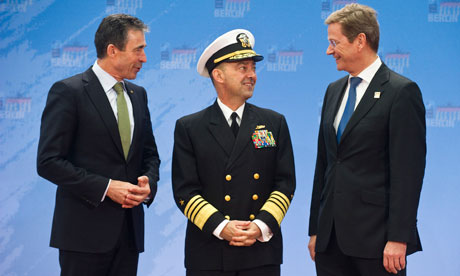Nato commander of Libya mission pleads for specialised fighter jets
Admiral James Stavridis says precision ground-attack jets would help minimise civilian casualties

The Nato secretary general, Anders Fogh Rasmussen, the Nato commander of the Libya mission, Admiral James Stavridis, and the German foreign minister, Guido Westerwelle, in Berlin. Photograph: John Macdougall/AFP/Getty Images
The Nato commander in charge of the operation in Libya has issued a plea for more specialised fighter jets to join the operation if civilian casualties are to be minimised.
At a meeting of Nato foreign ministers in Berlin, Admiral James Stavridis asked for more "precision fighter ground-attack aircrafts" which could best identify land targets, said Anders Fogh Rasmussen, the Nato secretary general.
The US military has the world's most sophisticated warplanes, but Rasmussen insisted Stavridis had not singled out the Americans when making his plea. After its lead role in Iraq and Afghanistan, the US has taken a back seat in the Libyan operation, leaving Britain and France to lead the charge against Muammar Gaddafi.
The US ended strike missions earlier this month, depriving Nato of warplanes such as A-10 Warthogs and AC-130 gunships, which can be more accurate than higher-flying jet fighters for ground-attack missions.
Rasmussen said he was confident more member countries would "step up to the plate" but admitted he had "no specific pledges" following the first meeting of the two-day summit.
He said he had "heard statements which give me hope" that by the time the ministers fly home on Friday, more countries will have increased their commitment to the Libyan operation.
He dismissed any notions of a schism between Nato's 28 members following the decision of many countries, including Germany and Turkey, not to take part in the operation other than on a humanitarian level. In a briefing earlier, Spanish officials said they would not take part in any ground attack.
Rasmussen insisted the foreign ministers had a shared goal. "We are committed to provide all necessary resources and maximum operational flexibility within our mandate. A high operational tempo against legitimate targets will be maintained and we will exert this pressure for as long as necessary," he told a press conference at Germany's foreign ministry.
He said the group had agreed the mission would continue until it achieved its three objectives, which were:
• All attacks and threats of attack against civilians and civilian-populated areas have ended.
• The regime has verifiably withdrawn to bases all military forces, including snipers, mercenaries and other paramilitary forces, including from all populated areas they have forcibly entered, occupied or besieged, throughout all of Libya, including Ajdabiya, Brega, Jadu, al-Jebal al-Gharbiya, Kikla, Misrata, Nalut, Ras Lanuf, Yefrin, Zawiya, Zintan and Zuara.
• The regime must permit immediate, full, safe and unhindered humanitarian access to all the people in Libya in need of assistance.
In the three weeks of the mission, Nato planes have flown over Libya 2,000 times, including 900 attack sorties, said Rasmussen, who reiterated that Nato believed that "a transparent political solution" was "the only way to bring an end to the crisis and build lasting peace in Libya and a better future for the Libyan people".
The alliance agrees that Gaddafi must be ousted, but it has previously been at odds on how to proceed. One proposal from Italy – Libya's former colonial ruler – calls for the western powers to provide defensive weapons to rebels. In Berlin, France's foreign minister, Alain Juppé, said he did not share the Italian view.
France has said Nato is not doing enough, and was pushing other countries at the meeting to work on "more robust, more efficient, more rapid actions", according to the French foreign ministry spokesman Bernard Valero in Paris.
The rebels have been urging the US military to reassert a stronger role in the Nato-led air campaign. The Obama administration, however, has insisted the US will stick to its plan of remaining in a supporting role, and the Pentagon noted that Americans have flown 35% of all air missions over the past 10 days.
The US secretary of state, Hillary Clinton, appealed to the other Nato foreign ministers for unity. "As our mission continues, maintaining our resolve and unity only grows more important," she said. "Gaddafi is testing our determination."
Nato members are "sharing the same goal, which is to see the end of the Gaddafi regime in Libya," Clinton said. "We must also intensify our political, diplomatic and economic mission to pressure and isolate Gaddafi and bring about his departure."
The world must "deepen our engagement with and increase our support for" the Libyan opposition, she added.
No comments:
Post a Comment